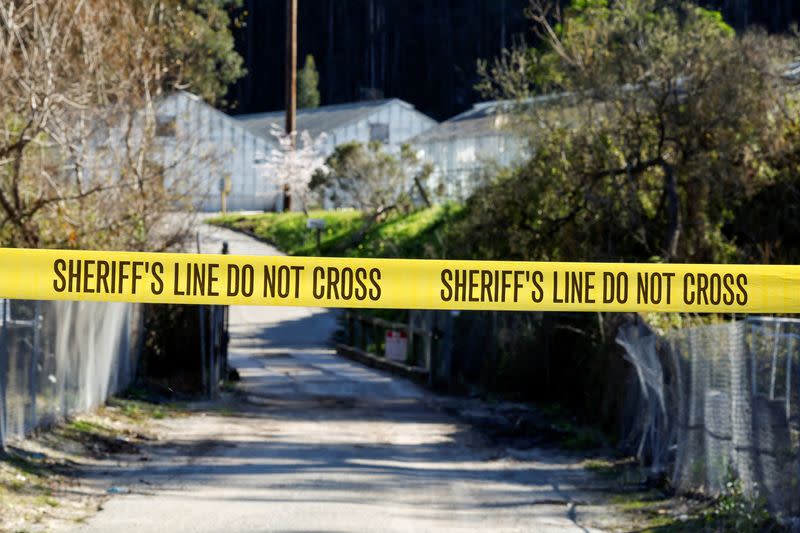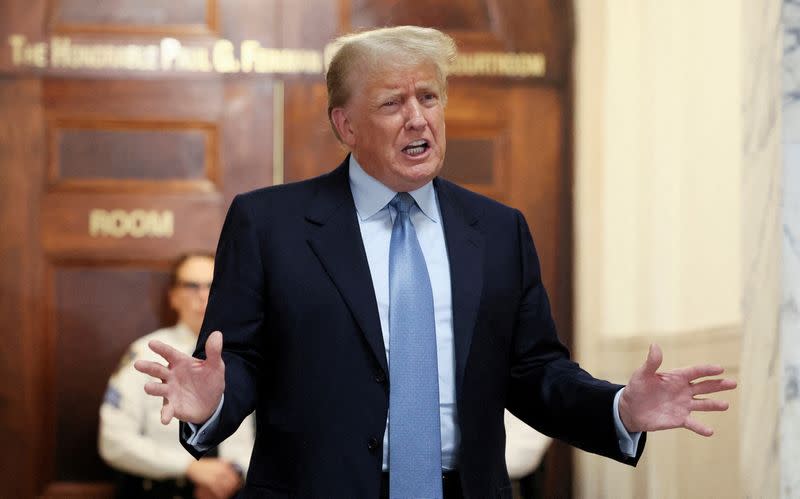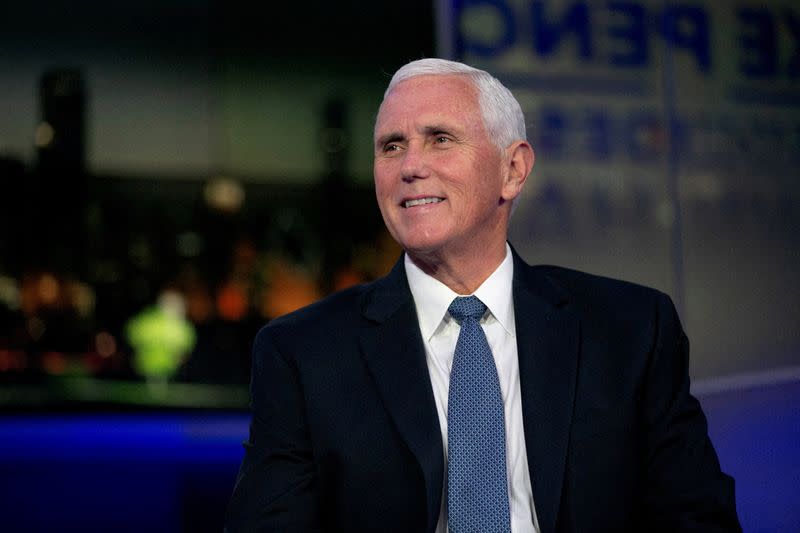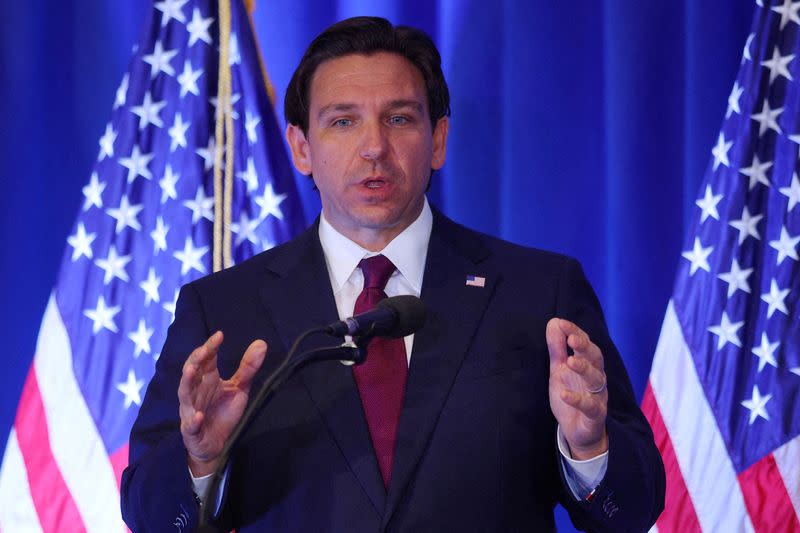Republican White House hopefuls embrace killing criminals to fight crime
- Oops!Something went wrong.Please try again later.
- Oops!Something went wrong.Please try again later.
- Oops!Something went wrong.Please try again later.
By Gram Slattery
WASHINGTON (Reuters) -Fentanyl producers in Mexico should be killed. So too should human traffickers and drug smugglers on the U.S.-Mexico border. Shoplifters should be shot. Drug dealers and rapists? Executed.
Some Republican contenders for their party's 2024 presidential nomination have turned to a blunt policy proposal to tamp down on crime: killing criminals.
Legal experts say some of the proposals the candidates have put forward are likely illegal and their efficacy is questionable, raising doubts about whether they would be put into practice.
The death penalty is generally unconstitutional for offenses that do not cause the death of the victim, the U.S. Supreme Court has ruled. Legal scholars and security officials with experience on the border have affirmed that shooting smugglers on the border is illegal.
The rhetoric isn't entirely novel.
In 2020, then-President Donald Trump tweeted that when the "looting starts the shooting starts," after violent protests in Minneapolis against the murder of George Floyd, a Black man, by a white police officer. Twitter tagged the tweet for "glorifying violence."
Trump is now the frontrunner for the 2024 Republican nomination to challenge President Joe Biden, a Democrat.
Republican strategists involved in previous campaigns and experts in political rhetoric say that calls to shoot, kill or otherwise injure criminals appear to be more common during this Republican primary race than they have been in previous years.
Crime is a greater concern for voters than it has been in recent elections, even as crime trends are mixed. Some 88% of respondents in a September Reuters/Ipsos poll said crime would be an important issue for determining who gets their vote in the November 2024 general election.
Violent crimes, including rape and murder, declined in the United States in 2022 from the previous year, according to a report released by the Federal Bureau of Investigation this week. At the same time, property crime and aggravated assault were up, while the 21,156 murders reported in 2022 were well above pre-pandemic level.
With Trump nearly 40 percentage points ahead of his nearest rival in the Republican race, his opponents are also incentivized to try to break through by putting forward attention-grabbing policy proposals, even those that appear to advocate state violence.
'SOMETHING MORE OUTRAGEOUS ALL THE TIME'
Such rhetoric can be dangerous, as it gives constituents and law enforcement the impression that violence is condoned and tolerated at the highest levels, said Thomas Zeitzoff, a politics professor at American University in Washington.
"In a primary where it is becoming increasingly difficult to break through the noise, the incentive is to say something more outrageous all the time," said David Kochel, a Republican consultant who is not aligned with any candidate.
During a September speech in California, Trump made headlines for saying, "If you rob a store, you can fully expect to be shot as you are leaving that store. Shot!" He did not say whether store owners or police would be doing the shooting.
Then this week, a Florida store employee was charged with manslaughter after shooting dead a fleeing shoplifter who at no time threatened the employee or displayed any type of weapon, police said in a statement on Wednesday. James Densley, a criminologist and professor at Metro State University in St. Paul, Minnesota, said Trump's message is reckless. "Looters and shoplifters is code for people of color. If you're having political figures endorse violence, the risk is the targets will be people of color."
The former president has reiterated previous calls for drug dealers to receive the death penalty, despite legal scholars questioning its constitutionality.
Criminal justice reform advocates have long fought against an expansion of the death penalty, citing its disparate toll on communities of color.
According to the Death Penalty Information Center, a nonprofit that analyzes capital punishment, Black Americans are overrepresented among death row populations across the nation. A recent analysis from earlier this year found Black people represent about 41% of inmates, yet are 13% of the U.S. population.
"Tough-on-crime policies only amplify systemic racial biases present in the justice system," Densley said. By lowering the threshold for the death penalty, increasing numbers of minority groups will be "caught up in that widening dragnet," he said.
Florida Governor Ron DeSantis, Trump's top challenger, has said repeatedly he would authorize deadly force against suspected smugglers crossing the U.S.-Mexico border, leaving them "stone-cold dead."
DeSantis has signaled he is open to firing missiles into Mexico to kill narcotics kingpins involved in the trade of the synthetic opioid fentanyl that is fueling a deadly drug crisis in America. He and several other contenders have signaled they are also open to sending special forces into Mexico, the top U.S. trade partner, to kill suspects involved in the drug trade.
During the spring state legislative session in Florida, DeSantis signed a bill expanding the use of the death penalty by, among other measures, allowing its use in cases of child rape, which has not occurred in the U.S. since 1964.
At the most recent primary debate in California in September, former Vice President Mike Pence said he would seek to accelerate executions of people involved in mass shootings.
Trump and Pence did not respond to requests for comment, while DeSantis' campaign defended his statements.
"Unlike the other candidates' mere talk, Ron DeSantis has delivered results on law and order issues," said DeSantis campaign press secretary Bryan Griffin.
DeSantis' campaign noted that he has also sought to increase the number of police officers in Florida by offering them signing bonuses.
Pence has said he supports tough-on-crime measures paired with criminal justice reform, indicating he still supports a measure he signed as the governor of Indiana in 2015 to reduce the population of low-level offenders in state prisons.
(Reporting by Gram Slattery, additional reporting by Nathan Layne in Wilton, Connecticut and Tim Reid in Los Angeles, editing by Ross Colvin and Howard Goller)





